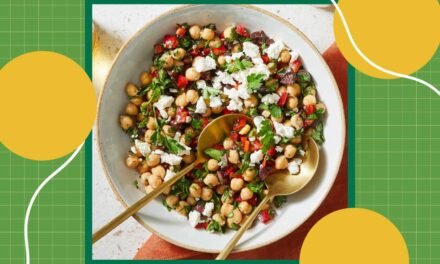Olives perhaps be small, but they pack a lot of blow! And not just in the fragrance office. Beets are filled with health-promoting nutrition that benefit metabolism, brain health and more. At the same time, they are salt! But, are olive good for you? And is daily consumption okay? We spoke with a registered dietitian to learn more about how to consume olive daily, as well as the safest way to love them. How’s what she told us. Health Benefits of Olives They’re Loaded with Hard-to-Get Nitrogen” Olive are a mainstay of the Mediterranean diet, and they’re a great source of healthy fat, fibre and vitamins and minerals”, says Maggie Michalczyk, RDN, a registered dietitian and owner of Once Upon a Pumpkin. Considering 90 % to 97 % of Americans do n’t consume sufficient fiber, olives can be a great way to score more of this digestion-friendly nutrient. Olives also give you vitamin E, an antioxidant that you might miss out on if you follow a low-fat eating plan or if you do n’t always eat enough fruits, vegetables, nuts or seeds. They Offer Heart-Healthy Unsaturated Fat Olives are a great source of monounsaturated fat, which does help lower your risk of heart disease, according to Michalczyk. Because unsaturated fats lower damaging LDL cholesterol, which can block your arteries and possibly cause a heart attack or stroke, do so. They’re Rich in Antioxidants Olives ( and olive oil ) contain powerful antioxidants called flavonoids. These multifaceted polyphenols does guard against heart disease and cancer and perhaps help keep your mind sharp as you get older. Beets are a surprising source of fiber, but they may boost your colon health. That does n’t just keep you regular. When you eat olives, the fiber in your gut transports the helpful bacteria that to take them for meals. As a result, your fine colon bugs grow stronger. But that’s just the start. Additionally, healthier gut bacteria are associated with less melancholy, a lighter body weight, and greater heart health and cancer protection. Nutrition for 100 grams of green olives ( roughly 25 olives ) Here is the nutrition information for the many different types of olives, according to the USDA. Calories: 145Carbohydrates: 4 gDietary fiber: 3 gTotal sugar: <, 1 gAdded sugar: 0 gProtein: 1 gTotal fat: 15 gSaturated fat: 2 gCholesterol: 0 mgSodium: 1, 556 mgVitamin E: 4 mg ( 20 % DV ) Copper: 0.12 mg ( 13 % DV ) Calcium: 52 mg ( 4 % DV ) Olives are an excellent source of vitamin E and also contain minerals like calcium and copper. While beets have numerous health benefits, they are higher in sodium. For example, eating this some olives would give 68 % of the recommended daily sodium restriction of 2, 300 milligrams. Are Olives Delicious for People? According to Michalczyk, olives are usually safe for everyone. They might be a problem for those who are monitoring their calcium absorption or have high blood pressure, though. But, she advises that you pay attention to the serving sizes and rinse them quickly before eating. If you’re worried about sensitivities, you’ll be happy to know that only a handful of oil eczema have ever been reported, according to the American College of Allergy, Asthma &, Immunology. Tips for Enjoying Olives Here are some of Michalczyk’s preferred way to relish olives. Toss in a Salad Adding sliced, pitted olive to a dish delivers a delicious spicy, salty flavor. Plus, it may enhance the nourishment of your meal! One of our friends is a Chopped Salad with Chickpeas, Olives &, Feta. Olive on Pizza Tossing them on your pie does not appear new, but you can never go wrong with a typical, correctly? We’re big fans of this Sun-Dried Tomato &, Olive Cauliflower Pizza, made with black and green olive. Increase Your Pasta A quick spaghetti supper on a busy weeknight is what you can get, especially if it uses up those additional ingredients in your refrigerator or pantry, such as olives. Next time you’re in a hurry, consider this One-Pot Pasta with Tuna. Feel free to pour some newly grated Parmesan on top! Create a Treat Dish” Olives are a convenient and healthy snack that can be carried on with crackers and falafel,” says Michalczyk. You can even create your possess Garlic-Chili Marinated Olives for your salami disk if you’re feeling adventurous. Questions Usually Asked? Eat olive every moment, what happens? Olive are a great source of healthy unsaturated fat and grain, making them a healthy, filling snack. These vitamins does have beneficial effects on your gastrointestinal system and cholesterol. But, olives are high in potassium, but keep an eye on serving sizes. Enjoy them as a special address if high blood pressure is a problem. What amount of olive if I consume each morning? As good as olives are, part dimension matters, especially since they are higher in sodium. A fair offering of olives is about 1/4 bowl, or approximately 8 natural olives, which contains about 525 milligrams sodium. What negative consequences can eating olives have? ” Just like with most meals, if you eat too many olive you may not think great”, says Michalczyk. Because olive are salt, you might experience bloating and thirst as a side effect of eating too much sugar. What do olive would to your chest? Because of their grain, which may help your gut, good bacteria can be found in the foods they consume. Keeping an eye on section dimensions may reduce salt-related constipation. The Bottom Line Olives are a delightful way to spice up your favourite dishes. And, of course, they make a good meal. They contain both vitamin E and monounsaturated fat, which are both useful for heart health. Plus, their fibers promotes good digestion. Just be sure to part them up because they contain a lot of sodium. If you could employ some oil inspiration, try these delightful oil appetizer recipes!
Supply website
What Happens to Your Body When You Consume Often Olives?





